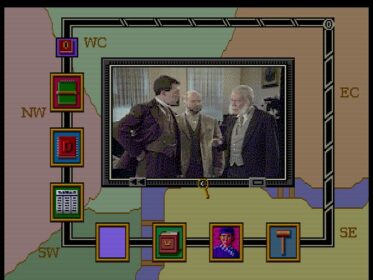Developer: Icom Publisher: Icom Release: 1991 Genre: FMV
I remember the promise that FMV had back when CDs were first introduced to video games. We were young and dumb and thought we would be controlling our cartoons. Instead we were stuck watching ugly footage of bad actors and occasionally pressing a button to make it seem “interactive”. While the majority was nothing but tosh we have all forgotten about occasionally one would rise above the muck and fulfill that promise. Sherlock Holmes: Consulting Detective is one of those games, a title that uses its FMV to enhance the experience rather than making it the focus and is better for it.
There is a long history behind Sherlock Holmes: Consulting Detective. I had no idea it was based on a board game of the same name which is pretty cool. But I also was not aware it was originally released for the FM Towns Marty before being ported to nearly every platform with a CD drive. For god sake they even re-released the game for DVD players like Dragon’s Lair! This Turbo CD version was my first exposure to the game as I saw it on Gamepro TV. That brief footage was enough to spark my interest but the glut of terrible FMV games left me wary. It should not have, this is a good example of the genre done right.
Sherlock Holmes: Consulting Detective is a FMV game but has more in common with point and click adventure games. The difference is you are not building up an inventory of items by clicking the environment. Instead you visit different locations and watch the conversations that take place for clues to progress. There are three cases: in each Holmes and Watson meet with a client who offers background information and clues. From there you can read the newspaper for clues or choose a location/person to visit from the directory. You will either see a clip of their conversation or if it is a dead end a funny exchange between the detective duo. The object is to find enough clues to build a solid case before the judge. There is no time limit. However you as the player are competing against Holmes and receive a score at the end of each case.
Admittedly the gameplay is slight. Outside of selecting locations and interviewing people you are taking notes to determine the killer and their motive. That means paying attention for hints lest you end you up clicking on random names needlessly. As such the game leans heavily on its performances to keep you engaged and succeeds. The majority of the actors do a good job in their roles with only a few minor characters overacting. The slow cursor based interface is the only fly in the ointment but that is unavoidable. This is what I wanted out of FMV games. Use the FMV to highlight important moments or as a reward, not just looping video with a tacked on interface that takes you out of the gameplay. RPGs seemed to get it, other genres not so much.
Next to its slow interface the only thing holding the game back is its brevity; there are only three cases. While it may take a little time to solve each as a whole the game still feels short. Once complete the only incentive to replay the game is to try and solve each mystery in as few visits as possible to achieve a higher score and beat Sherlock Holmes. I like the game and all but not enough to replay it multiple times for points like a shooter. Two more cases would make this feel like a more complete experience. To its credit most versions were console pack-ins in with each console so you were not buying it separately.
In Closing
Sherlock Holmes: Consulting Detective surprised me. I admit I was ready to toss it in the pile of awful multimedia games that infested CD based platforms. Instead I found a game that uses its FMV to engage the player in a way not possible before. Although the interface is clunky it barely matters. I enjoyed this one thoroughly and look forward to playing volume II real soon.




